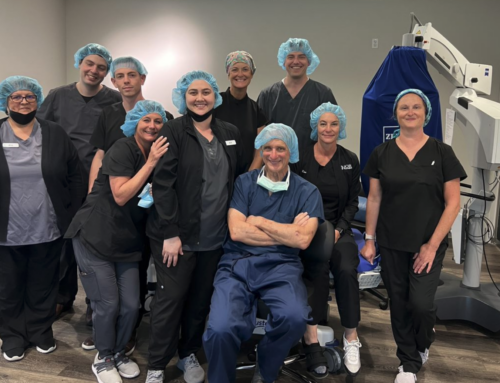Prevent Blindness, a national non-profit organization with a mission to prevent blindness and preserve eyesight has declared April as Women’s Eye Health and Safety month.
Women face unique eye health, a higher risk of certain eye diseases, and different symptoms of eye problems than men. One of the primary eye health concerns for women is hormonal changes. Hormonal changes during pregnancy, menopause, and menstruation can cause dry eye, eye strain, and changes in vision. In addition, women may experience more frequent headaches or migraines related to eye strain. They may also have a greater sensitivity to light, particularly during hormonal changes. Recognizing these symptoms and seeking treatment can help prevent more serious eye problems.
Women who wear contact lenses may also experience discomfort or difficulty wearing their lenses during these times. It’s important for women to discuss these changes with their eye doctor and seek treatment if necessary.
Women and eye diseases:
- Dry eye disease – Dry eye disease happens when the eyes can’t produce enough tears, or tears are of poor quality. Women are more likely to develop dry eye disease due to hormonal fluctuations, certain medications such as oral contraceptives, and makeup use.
- Age-related macular degeneration – Age-related macular degeneration (AMD) is a serious eye disease that slowly destroys central vision due to damage to the macula—the central part of the retina responsible for clear, sharp straight-ahead vision. Women are more susceptible to AMD because they tend to live longer than men.
- Cataracts – Women are more likely than men to develop cataracts, which is a clouding of the lens of the eye. Cataracts can lead to blurred vision and difficulty with daily activities.
- Glaucoma – Glaucoma is a group of eye diseases that damage the optic nerve and cause vision loss and even blindness. Women are at higher risk of developing angle closure glaucoma, but there is no clear gender preference for open angle glaucoma (the most common form of glaucoma).
Good Eye Habits to Lessen or Prevent Future Vision Problems
Have an annual eye exam.
Seeing an eye doctor regularly is one of the best things you can do for your eyesight. Women should have a comprehensive eye exam once a year, even if they don’t have any vision problems. Many eye diseases and conditions have no symptoms in the early stages. During an eye exam, your eye doctor can detect any issues early before they cause permanent damage.
Eat a healthy diet.
Good nutrition is the key to good health, including your vision. Eating foods rich in vitamins A, C, E, zinc, and omega-3 fatty acids helps protect against macular degeneration and other age-related vision problems. Also, remember to keep your diet low in sodium and caffeine.
Additionally, drinking plenty of water helps keep your eyes hydrated and helps flush out toxins from the body that could lead to dry eye or eye discomfort.
Quit smoking.
Crushing the habit of smoking can reduce the risk of a host of diseases such as cancer and respiratory issues. Smoking is the most important risk factor for AMD and progression.
Protect your eyes from the sun.
Make sure that you always wear sunglasses when you go outside to protect your eyes from UV rays which can cause long-term damage to the eyes. Also, be sure to apply sunscreen around the eyelids and wear a wide-brimmed hat when spending time outdoors on sunny days.
Pregnant women should see their eye doctor regularly!
If you are pregnant, discuss any vision changes with your eye doctor so you can get the correct prescription change, if needed.
Know your family history.
If you have a family history of eye diseases such as glaucoma or macular degeneration, you are at a greater risk of developing these conditions. Make sure to discuss your family history of eye diseases with your optometrist, so they can monitor your eyes regularly and detect any signs of disease early on.
Wear protective eyewear.
Wearing safety glasses when playing sports and participating in potentially hazardous activities can help protect against injuries caused by flying objects or blunt trauma. If you work with hazardous chemicals or materials, make sure that you always wear protective eyewear while doing so to prevent any potential harm to your eyes.
Take regular breaks from screens.
Be mindful when using digital devices such as smartphones and tablets. Staring at screens for too long can lead to eyestrain, fatigue, dryness, headaches, and blurry vision. To avoid this, make sure that you give yourself breaks from looking at screens throughout the day.
If you are experiencing any symptoms or have concerns about your eye health, make an appointment today to find the best treatment for your needs! In addition to our advanced diagnostic and surgical services, Barth Vision & Optical also offers a full-service optical department where patients can choose among a wide variety of frames, specialty lenses and sunglasses, including many designer brands not available in most optical shops.


